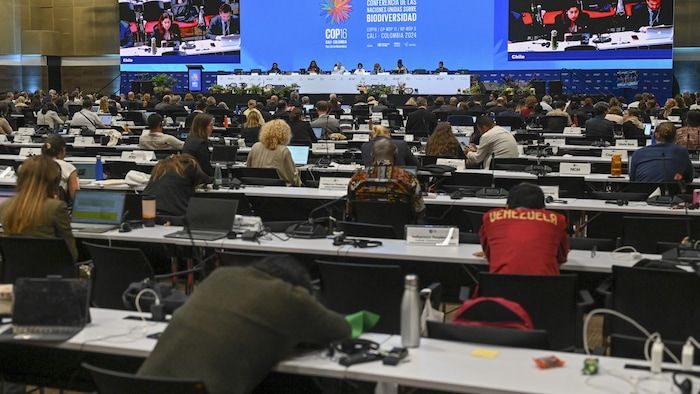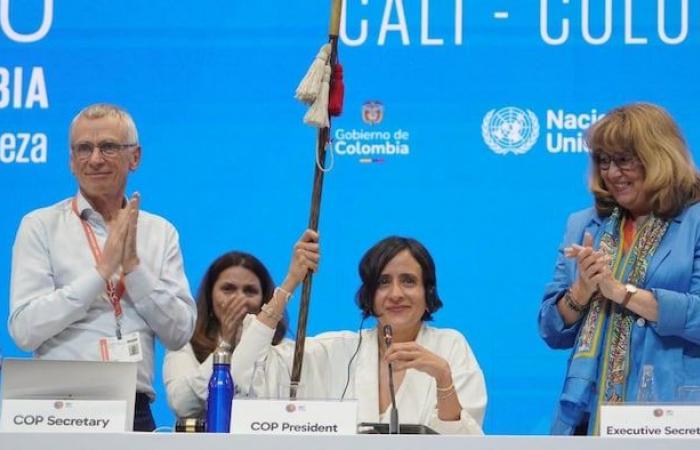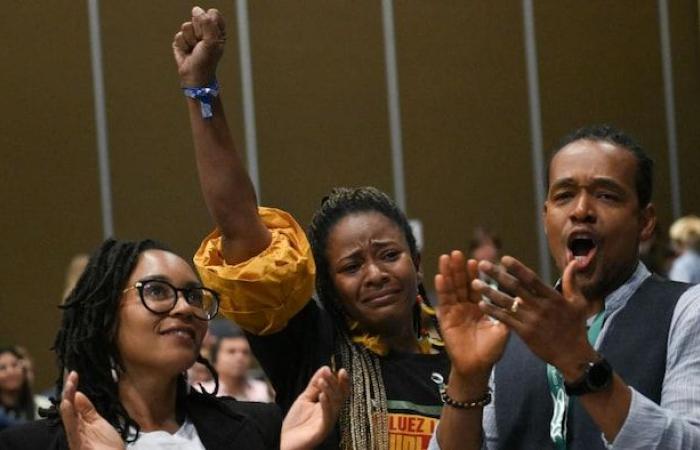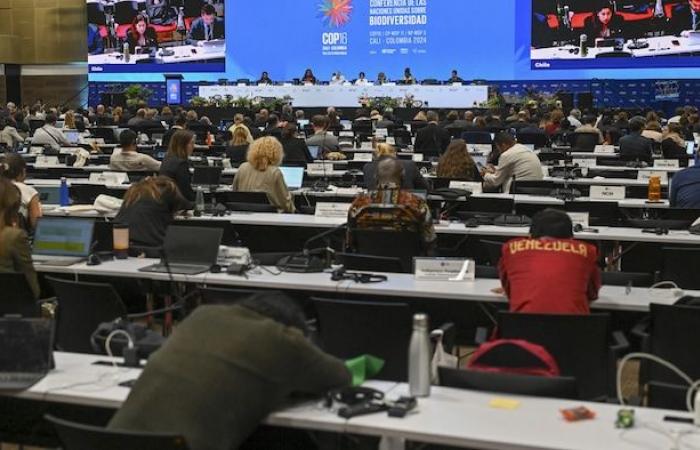Cali, Colombia – Buried by applause and singing, the moved COP16 President formalized the creation of a permanent group for indigenous peoples and local communities, a first in the history of the biodiversity convention .
This is a major step
declared Susana Muhamad, Colombian Minister of Environment and Sustainable Development, on the last evening of the COP16 negotiations on biodiversity in Cali.
The adoption of this request, which the indigenous representatives considered a priority, crystallized the message that Minister Muhamad wanted to infuse into this COP peoples
: the efforts and knowledge of all of society must be put at the service of biodiversity.
The issue was resolved shortly before the end of the negotiations, while uncertainty still hovered the day before. As the end of the summit neared, indigenous representatives had urged countries to find common ground. Other requests could be postponed until the next time COPbut not this one, they pleaded.
On Friday evening, delegates from around the world took the floor to support the proposal led by Brazil and Mexico, with each statement in support of the creation of a permanent group accompanied by a round of applause.
This new group is a reference for the rest of the world. The parties must recognize that our serious and effective participation is necessary if we are to achieve our objectives.
If many delegates welcomed a decision historical
et important
to preserve biodiversity, it is because such a group did not exist before today within the major environmental conventions.
The Convention on Biological Diversity (CBD) already mentioned the contribution of these peoples, particularly in the flagship objective of the Kunming-Montreal global framework, namely the protection of 30% of lands and oceans by 2030. However, they were until now confined to the outskirts of places of decision-making.
Open in full screen mode
The president of COP16 on biodiversity, Colombian Minister Susana Muhamad, joined the celebrations of indigenous representatives.
Photo: COP16 Colombia
The creation of this permanent entity – a subsidiary body
in the jargon ofHIM – must allow representatives of indigenous and local communities to come together to coordinate their message, establish the actions they consider essential to stop the decline of biodiversity and, ultimately, try to influence decisions.
Above all, advance the issues that concern them.
Afro-descendants, key players
for biodiversity
In turn, representatives of Afro-descendant communities celebrated, after delegates agreed to explicitly include them for the first time in the text of the Convention.
Open in full screen mode
The inclusion of the role played by Afro-descendant communities in the text of the Convention on Biological Diversity led to celebrations and chants in the plenary hall.
Photo : Getty Images / AFP / JOAQUIN SARMIENTO
Under this proposal, supported by Colombia and Brazil, the CDB now recognizes the crucial role of initiatives and actions carried out by people of African descent […] in the conservation of biodiversity
.
Concretely, this mention should allow these communities to have access to the financing mobilized, among others, by the 196 countries of the Convention and to be heard more during the next COP on biodiversity.
Agreement on digital sequencing information
After the celebrations, delegates tackled issues that have kept negotiators busy behind closed doors in recent days: mobilizing financial resources and sharing benefits from genetic resources.
After several hours of talks, delegates agreed to establish a fund to charge large companies that use genetic data banks for commercial purposes.
By recreating this digital sequencing information (DSI) in the laboratory without having to go into the field, major players in the pharmaceutical, agri-food and biotechnology industries have been able to enrich themselves without having to compensate the communities where it comes from. this biodiversity.

Open in full screen mode
It was a long night for delegates gathered in Cali for COP16 on biodiversity. Without consensus, negotiations lasted until morning.
Photo : afp via getty images / JOAQUIN SARMIENTO
Despite the reluctance of several countries where these industries thrive, such as Switzerland, India and Japan, the States agreed early Saturday morning to create the Cali Fund, to the great relief of Minister Muhamad.
Without being binding, the text stipulates that all those who use these DSI on genetic resources should share profits fairly and equitably
.
Half of the funding [ainsi amassé] should support the needs identified by indigenous peoples and local communities.
Blockage on financing
In parallel with the debates on the Cali Fund, the negotiations on financing provoked an outcry from several countries, including Canada.
Since the adoption of the global framework in Montreal, the way in which sums are mobilized by States to fill the biodiversity financing gap – 700 billion dollars per year by 2030 – does not make the countries of the South happy .
Not only have states failed to keep their promise to raise US$20 billion a year by 2025, but the money is slow to reach those who need it most.
In the middle of the night, the Colombian presidency created a surprise by proposing the creation of a new fund. Taken by surprise, Switzerland, the European Union, New Zealand, Canada, Japan and Australia formed a united front against the countries of the South.
After 10 hours of negotiations, Minister Muhamad decided to postpone the issue until later.
On the way to Armenia
Following a secret vote, Armenia was elected on the penultimate day of the summit, by 65 votes to 58, as the host country of the next meeting on biodiversity, COP17, in 2026. country was pitted against Azerbaijan, with whom it has been in conflict for decades, with both countries claiming Nagorno-Karabakh








